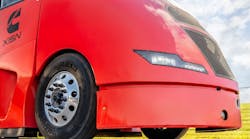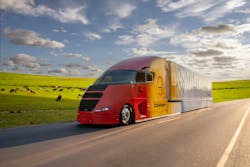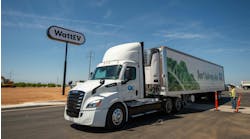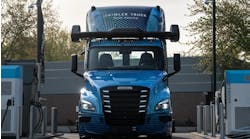Shell's third-generation Starship truck, equipped with a Cummins X15N natural gas engine and powered by renewable natural gas (RNG), completed an 840-mile loop throughout California. According to Shell, the truck achieved improvements over the U.S. average for diesel Class 8 trucks with 2.542 times better freight ton efficiency (FTE) assessed on a ton-miles per gallon basis and 3.23 times better FTE assessed on a ton-miles per kg of CO2e emitted basis.
"Shell Starship 3.0 demonstrates the power of innovation by incorporating a new natural gas engine complimented by today's available technologies to help reduce emissions in the road transport industry," said Dr. Selda Gunsel, president of Shell Global Solutions and VP of fuels and lubricants technology. "Industry collaboration is critical in helping fleets achieve their sustainability goals."
The truck also included components and features that promote lightweighting, low aerodynamic drag, and low rolling resistance tires. It operated using a low-viscosity Shell Rotella natural gas engine oil and Shell Spirax transmission and axle oils.
"Each Starship generation shows our current and future customers that we are leading the effort to empower fleets with real-world data that will help guide their decisions to help reduce emissions," Tom Mueller, GM of Shell commercial road transport lubricants, said. "Shell Starship is a proving ground of how working together across the industry can lead the way to more sustainable solutions."
Since its start in 2018, the Starship initiative has showcased that innovation and collaboration through the development of new technologies and fuels can help reduce emissions in the transportation sector. This truck version included partnerships with Cummins for the driveline technology, Bridgestone for tires, and Trillium (part of Love's family of companies) for renewable natural gas.




